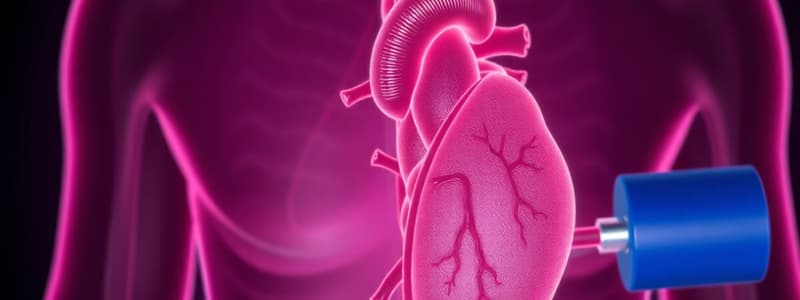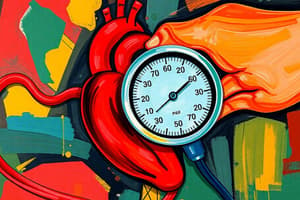Podcast
Questions and Answers
Which mechanism involves the vesicular transport of macromolecules across a cell?
Which mechanism involves the vesicular transport of macromolecules across a cell?
- Hydrostatic transport
- Diffusion
- Transcytosis (correct)
- Filtration
What primarily determines the movement of water across capillary membranes?
What primarily determines the movement of water across capillary membranes?
- Starling equilibrium (correct)
- Venous pressure
- Osmotic pressure only
- Capillary blood flow rate
Which substance diffuses from capillaries into tissues?
Which substance diffuses from capillaries into tissues?
- Lipids
- Na+
- Cl-
- CO2 (correct)
How much of the total blood volume is typically contained in veins?
How much of the total blood volume is typically contained in veins?
What condition causes water to move from the interstitium into the capillary?
What condition causes water to move from the interstitium into the capillary?
What is the formula for calculating Mean Arterial Pressure (MAP)?
What is the formula for calculating Mean Arterial Pressure (MAP)?
Which type of artery is characterized by high compliance and low resistance?
Which type of artery is characterized by high compliance and low resistance?
What primarily regulates blood flow through arterioles?
What primarily regulates blood flow through arterioles?
In a blood pressure reading of 120/80 mmHg, what is the systolic blood pressure (SBP)?
In a blood pressure reading of 120/80 mmHg, what is the systolic blood pressure (SBP)?
Which of the following statements about pulse pressure (PP) is correct?
Which of the following statements about pulse pressure (PP) is correct?
What is the main function of the peripheral arterial system?
What is the main function of the peripheral arterial system?
Which of the following arteries is directly associated with blood pressure measurement?
Which of the following arteries is directly associated with blood pressure measurement?
Which component primarily controls the cardiac output regulation?
Which component primarily controls the cardiac output regulation?
What does pulse pressure (PP) depend on?
What does pulse pressure (PP) depend on?
What is the relationship between venous return and cardiac output according to the Frank-Starling principle?
What is the relationship between venous return and cardiac output according to the Frank-Starling principle?
What happens to stroke volume as heart rate increases significantly?
What happens to stroke volume as heart rate increases significantly?
What does the Mean Arterial Pressure (MAP) depend on?
What does the Mean Arterial Pressure (MAP) depend on?
What physiological factor influences cardiac output through preload?
What physiological factor influences cardiac output through preload?
Which of the following causes an increase in venous return?
Which of the following causes an increase in venous return?
At what heart rate does the increase in heart rate notably affect cardiac output?
At what heart rate does the increase in heart rate notably affect cardiac output?
Which of these statements about stroke volume (SV) is correct?
Which of these statements about stroke volume (SV) is correct?
What effect does parasympathetic stimulation have on heart rate?
What effect does parasympathetic stimulation have on heart rate?
Which type of receptor is implicated in sympathetic nerve activity affecting heart contractility?
Which type of receptor is implicated in sympathetic nerve activity affecting heart contractility?
What is the impact of sympathetic stimulation on conduction velocity?
What is the impact of sympathetic stimulation on conduction velocity?
Which term refers to the effect of autonomic regulation on heart rate?
Which term refers to the effect of autonomic regulation on heart rate?
What happens to pacemaker activity during parasympathetic stimulation?
What happens to pacemaker activity during parasympathetic stimulation?
What kind of dromotropism is associated with parasympathetic stimulation?
What kind of dromotropism is associated with parasympathetic stimulation?
During which state does the parasympathetic system predominantly operate?
During which state does the parasympathetic system predominantly operate?
Which effect is primarily produced by sympathetic stimulation in relation to heart contractility?
Which effect is primarily produced by sympathetic stimulation in relation to heart contractility?
What is the pressure difference between the venule and the right atrium?
What is the pressure difference between the venule and the right atrium?
Which factor does NOT promote venous return?
Which factor does NOT promote venous return?
What happens to venous return when a person stands up suddenly?
What happens to venous return when a person stands up suddenly?
Which structure is responsible for preventing backflow of blood in veins?
Which structure is responsible for preventing backflow of blood in veins?
What role does the diaphragm play in venous return during respiration?
What role does the diaphragm play in venous return during respiration?
Which artery supplies blood to the left ventricle?
Which artery supplies blood to the left ventricle?
The coronary sinus drains blood into which part of the heart?
The coronary sinus drains blood into which part of the heart?
Which of the following statements about coronary circulation is true?
Which of the following statements about coronary circulation is true?
Flashcards are hidden until you start studying
Study Notes
Arterial Blood Pressure
- Mean Arterial Pressure (MAP): Average blood pressure during the cardiac cycle, represents the main driving force for blood flow.
- Arterial Pulse Pressure (PP): Difference between systolic and diastolic pressure, determined by stroke volume and aortic compliance
- Peripheral Arterial Pressure Curves: Shows variations in arterial pressure throughout the body's circulatory system.
Blood Pressure Measurement
- Measured using a sphygmomanometer and stethoscope.
- Measured in the brachial artery.
- Sounds heard during measurement are called Korotkoff's sounds.
Control of Blood Pressure
- Determinants of Arterial Pressure: Determined by cardiac output and total peripheral resistance (TPR)
- Total Peripheral Resistance (TPR): Represents the resistance to blood flow in all the peripheral vessels combined.
Regulation of Cardiac Output
- Frank-Starling Principle: Cardiac output is dependent on preload (the amount of stretch in the ventricle), which is determined by venous return.
- Venous Return (VR): Flow of blood back to the heart.
- Increase in venous return: Due to increased total blood volume or redistribution of blood via venous compression/constriction
- Cardiac Output (CO): Amount of blood ejected from the heart per minute.
Regulation by Baroreceptor and Cardioregulatory Center
- Baroreceptors: Sensory receptors located in the aortic arch and carotid arteries, sensitive to changes in blood pressure.
- Cardioregulatory Center: Located in the brainstem, responsible for regulating heart rate, stroke volume, and vascular tone.
- Sympathetic Nervous System: Increases heart rate, contractility, and conduction velocity.
- Parasympathetic Nervous System: Decreases heart rate, contractility, and conduction velocity.
Arterial System & Function
- Elastic arteries: High in compliance, low in resistance, act as a pressure storage vessel and help to reduce heart work.
- Arteries: Relatively large diameter compared to vessel wall thickness, contribute to low resistance and a small pressure drop.
- Arterioles: Small internal diameter, high resistance, considered "resistance vessels" as they cause a significant pressure drop.
- Arterioles: Control blood flow by constricting and relaxing smooth muscle within their walls which increases/decreases resistance, regulating blood flow.
Control of Blood Pressure: Physical & Physiological Factors
- Physical Factors: Influence pulse pressure (PP)
- PP is proportional to stroke volume (SV) divided by aortic compliance (C)
- Physiological Factors: Influence mean arterial pressure (MAP)
- MAP is equal to cardiac output (CO) multiplied by total peripheral resistance (TPR)
Effect of Heart Rate on Cardiac Output
- Relationship: Cardiac output (CO) is calculated by multiplying stroke volume (SV) and heart rate (HR).
- Stroke Volume: Decreases as heart rate increases due to shortened diastole, reduced ventricular filling, and decreased preload.
- Cardiac Output Changes with Heart Rate:
- HR increase up to 100: CO increases as the HR-increase effect outweighs SV-decrease effect due to increased contractility.
- HR between 100-200: No significant change in CO.
- HR over 200: CO decreases as SV-decrease effect outweighs the HR-effect.
Autonomic Regulation of the Heart
- Sympathetic innervation: To both atria and ventricles.
- Parasympathetic innervation: To the SA and AV nodes, as well as the atria.
- Parasympathetic effects: Decreases heart rate, contractility, and conduction velocity via M receptors.
- Sympathetic effects: Increases heart rate, contractility, and conduction velocity via b receptors.
Effects on SA Node
- Dromotropism: Changes in conduction velocity influenced by sympathetic and parasympathetic stimulation.
- Sympathetic stimulation: Positive dromotropism (increased conduction velocity) via NE.
- Parasympathetic stimulation: Negative dromotropism (decreased conduction velocity) via ACh.
- Dominant effect: Parasympathetic outweighs sympathetic on the SA node.
Studying That Suits You
Use AI to generate personalized quizzes and flashcards to suit your learning preferences.



